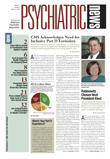How do you determine when a patient with depression is in remission? Not by symptom resolution alone, according to patients with the disorder.
A survey of 535 psychiatric outpatients who were being treated for DSM-IV-diagnosed major depressive episode found that they consider a wide range of factors when defining remission—and they do not consider symptom resolution alone to be sufficient. A report of the survey appears in the January American Journal of Psychiatry.
Among the factors considered of high importance in remission were“ features of positive mental health” such as optimism and self-confidence; a return to one's usual, normal self; and a return to usual level of functioning.
But several other factors were also rated highly, such as not getting overwhelmed by stress, ability to fulfill usual responsibilities, satisfaction with life, feeling in emotional control, and enjoying relationships with friends and family.
Psychiatrist Mark Zimmerman, M.D., lead author of the report, said the findings show that the emphasis on resolution of symptoms alone—during clinical trials and by clinicians in practice—is too narrow.
“Patients consider multiple factors as very important in determining whether they are in remission,” he said. “Certainly, these are not independent of themselves, but there is no consensus that there is one factor that should be clearly elevated above the others when determining if someone is in remission.
“And there is no indication that the concept should be narrowly defined in any case,” Zimmerman told Psychiatric News.
In the study, unstructured interviews were conducted with outpatients at Rhode Island Hospital Department of Psychiatry in which they were asked how they knew that their depression was in remission, or if they were still depressed, how they would know when their depression was in remission.
From these interactions Zimmerman and colleagues derived a list of 16 potentially relevant factors.
Then the survey group of 535 patients was asked to rate each of the factors in terms of importance in determining remission, using a numeric scale of 0 (not very important), 1 (somewhat important), or 2 (very important).
Most patients judged at least one of the 16 factors as very important in determining remission from depression. On average, patients rated 10.7 factors as very important. Eighty-two patients rated all 16 factors as very important in determining remission from depression, and 15 of the 16 factors were considered very important by more than half of the patients.
“Patients consider multiple factors as very important in determining whether they are in remission.”
The three factors that were the most frequently judged to be very important in determining remission were the presence of features of positive mental health such as optimism and self-confidence; a return to one's usual, normal self; and a return to usual level of functioning.
Four items were selected by more than 10 percent of the patients as the most important factor in determining remission from depression: presence of positive mental health, a return to one's usual self, a general sense of well-being, and the absence of symptoms of depression.
“The findings indicate for practicing clinicians that they should not limit their assessments to symptom severity alone,” Zimmerman said.“ For the field at large, it is time to start developing instruments that will more broadly capture an individual's functioning and ability to cope with stress.”
Am J Psychiatry 2005 163 148
